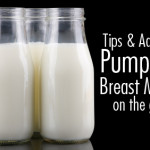 When a woman in the United States decides whether or not to breastfeed, she might consider a variety of factors, but access to clean water is not typically one of them. In a country where clean water is abundantly available at the turn of a faucet handle, a U.S. mother doesn’t have to worry about that part of the equation. At least that’s typically the case. But recently, 300,000 West Virginians learned that access to clean water isn’t just a problem a world away.
When a woman in the United States decides whether or not to breastfeed, she might consider a variety of factors, but access to clean water is not typically one of them. In a country where clean water is abundantly available at the turn of a faucet handle, a U.S. mother doesn’t have to worry about that part of the equation. At least that’s typically the case. But recently, 300,000 West Virginians learned that access to clean water isn’t just a problem a world away.
On January 9, 7,500 gallons of a chemical used in coal processing leaked from a storage tank and contaminated the water supply treatment facility just north of the West Virginia capital, Charleston. Those affected were instructed not to drink, cook or wash with the contaminated water for days. In many areas, the contamination is now below toxic levels and residents have been told it is safe to once again consume. In the aftermath, communities upstream are concerned for their own water supplies and are taking precautions to avoid exposure to the contaminated water.
For adults, this water crisis means having to find alternative sources of water or creative ways of avoiding it all together. But, for an infant, especially below the age of one whose main nutrition comes from formula, access to clean water is vital. For parents who formula feed and are affected by this water contamination, finding a source of clean water is suddenly an issue they have not previously encountered.
To read this complete article, please visit my guest post on the CWS blog.





